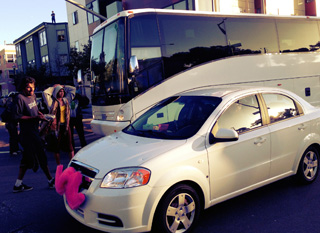Update: The California Public Utilities Commission unanimously approved new regulations around ride-sharing services in September.
The California Public Utilities Commission on Tuesday released long-awaited proposed regulations for smartphone-enabled "ride-share" services such as Lyft, Uber and Sidecar. These companies allow passengers to hire private drivers through online applications, bypassing local cabs.
The advent of these services has disrupted the taxi industry and prompted bitter reactions from licensed companies and drivers. Last August, the CPUC sent ride-sharing firms cease-and-desist letters, which they did not comply with. This January, the agency came to an agreement with the companies, allowing them to keep operating while it drafted new regulations.

The new proposal, which the CPUC will vote on Sept. 5, requires the ride-sharing companies to be licensed by the agency. They also would have to run background checks on drivers, institute driver-training programs and meet expanded insurance requirements, as well as maintain a zero-tolerance policy on drugs and alcohol.
The companies hailed the decision. In a blog post, Sunil Paul, CEO of Sidecar, wrote, "We couldn’t be more pleased with this outcome and applaud the CPUC for moving in favor of transportation innovation and consumer choice." John Zimmer and Logan Green, the co-founders of Lyft, wrote on that company's blog, "...the CPUC has set a new standard for safety in transportation while supporting innovation that makes cities safer, more affordable and better connected." Uber said in a statement that the proposal "reaffirms that Uber’s core business model of working with professionally licensed and regulated transportation providers can continue without change, while paving the way for a long-term regulatory framework for peer-to-peer ride-sharing services."
Yesterday, before the ruling, hundreds of taxi drivers rallied outside San Francisco City Hall, calling for Mayor Ed Lee to intervene and ban the companies from the city. At the rally, DeSoto Cab Co. President Hansu Kim said city officials are at fault for shortcomings in the city's taxi service, which many have said creates the demand for ride-sharing.